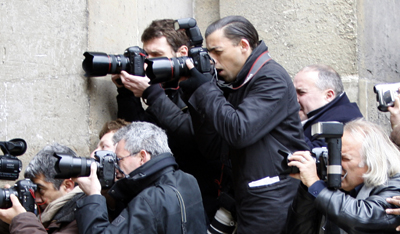New York, January 18, 2011–Tunisia’s transitional government should immediately release Fahem Boukadous, a television reporter imprisoned last year in reprisal for his work, the Committee to Protect Journalists said today. CPJ also offered condolences to the family and colleagues of French photographer Lucas Mebrouk Dolega, who died of head injuries suffered while covering the civil unrest in the capital, Tunis.
Mohamed Ghannouchi, prime minister of the transitional government, announced Monday that all political prisoners will be released, local and international media reported. CPJ research shows that Boukadous, a correspondent for the satellite television station Al-Hiwar al-Tunisi, is still being held in a prison in Gafsa, southwest of Tunis.
Jailed in July 2010, Boukadous is serving a four-year term in connection with his coverage of labor protests in the Gafsa mining region. He was charged with “belonging to a criminal association” and spreading materials “likely to harm public order.” The journalist’s wife, Afaf Bennaceur, told CPJ today that transitional authorities had decided to free Boukadous, but the release had not yet been carried out. Bennaceur said her husband’s health had deteriorated in prison: “He is undernourished and sick; he cannot take this for much longer.”
On Monday, the family of photographer Dolega confirmed that he had died of injuries suffered while covering street protests. Dolega, 32, was working for European Pressphoto Agency when he was struck in the head by a tear gas canister fired by security forces on Friday. He died “carrying out his passion and his job,” the family said in a statement. The French foreign ministry condemned the “disproportionate violence used against protesters and journalists.” At least 78 people died in unrest nationwide, The Associated Press reported, citing government figures.
Virtually all news and human rights websites blocked within the country during Zine El Abidine Ben Ali’s reign were made accessible after the regime fell on Friday, local journalists told CPJ. The newly accessible sites range from Kalima, an independent online news outlet that had been subjected to years of persecution, to CPJ website pages that detailed the brutal repression under Ben Ali.
For journalists, the most significant issue is now insecurity in the streets. “The problem now is security. The gangs do not differentiate between journalists and others. We also cannot work at night, due to the curfew,” Soufiane Chourabi, a reporter for the weekly Al-Tariq al-Jadid, told CPJ.
“We call on the transitional Tunisian government to immediately release the ailing journalist Fahem Boukadous who has already spent too much time in prison on fabricated charges,” said Mohamed Abdel Dayem, CPJ’s Middle East and North Africa program coordinator. “While we commend the transitional government for lifting censorship of news media, we urge the government to remove all remaining impediments to press freedom.”
